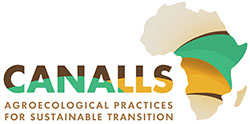Today, the concept of Living Labs is gaining increased attention and support by many governments and international agencies since it is increasingly difficult for a single stakeholder to find the right solutions to the complex challenges we are facing.
However, by collaborating and co-creating solutions with end-users and other actors involved, the complexity and uncertainty are reduced and the chance of finding a sustainable solution is increased. In Africa, although several agroecology (AE) initiatives have emerged, a holistic Agroecology Living Labs (ALLs) approach has not been applied so far. It is now being applied for the first time in the CANALLS project.
What is the CANALLS project about?
The CANALLS project (January 2023 - December 2026) is funded by Horizon Europe and will be implemented in four Central African countries, namely Burundi, Cameroon, DRC, and Rwanda, where 22 partners from Africa and Europe are engaged. One of the objectives of the project is to drive agroecological transitions in the humid tropics of Central and Eastern Africa by establishing multi-actor transdisciplinary ALLs.
What are the ALLs?
In the context of the CANALLS project, ALLs are place-based experimental sites where targeted and combined practices/solutions of agroecology will be co-designed and co-tested together with a multi-actor community consisting of diverse stakeholders (n = 20 stakeholders) to address specific challenges faced by end-users in real-life settings and communities in the four case study countries. ALLs are being implemented under the thematic work package 3 of the CANALLS project. The work package is led by NIBIO and supported by several project partners and diverse stakeholders that are engaged in the establishment and operationalization of the ALLs in the case study countries.
Where will ALLs take place?
We will set up eight ALL sites: i.e., two in Burundi, one in Cameroon, four in Democratic Republic of Congo, and one in Rwanda. All sites are context-specific transition pathways for agroecology. The basis for selecting these sites includes diversity of the farming systems, different AE zones, forest degradation levels and existing projects related to agroecology in the area. We envisaged the eight ALLs to be transformed from level 1 to level 2, 3 or 4 by implementing tailor-made combinations of AE strategies/practices which will be determined through co-creation workshops together with the muti-actors in each ALL.

What do we expect from the CANALLS project and ALLs?
The CANALLS project will capitalise and build on existing ongoing projects related to AE and/or innovation platforms where our project partners and stakeholders are involved in the project areas. This will facilitate the setting up of multi-actor ALLs, their implementation, knowledge sharing, capacity-building activities and networking. It is expected that members of ALLs will gain several benefits and opportunities, which among others include:
- Improved exchange of knowledge and experiences through learning and teaching in the process of co-creation, co-design, co-implementation of combined AE practices/ strategies, and co-evaluation
- Cross fertilization of new ideas for scientific research projects, dissemination, and impact of project results
- Increased networking and visibility in a larger multi-stakeholder community from individual and institutional perspectives
- Opportunities for partnering in future projects of scientific research and innovation; and
- Provision of support services and tools offered by the CANALLS project, e.g., in terms of capacity building and training activities.



